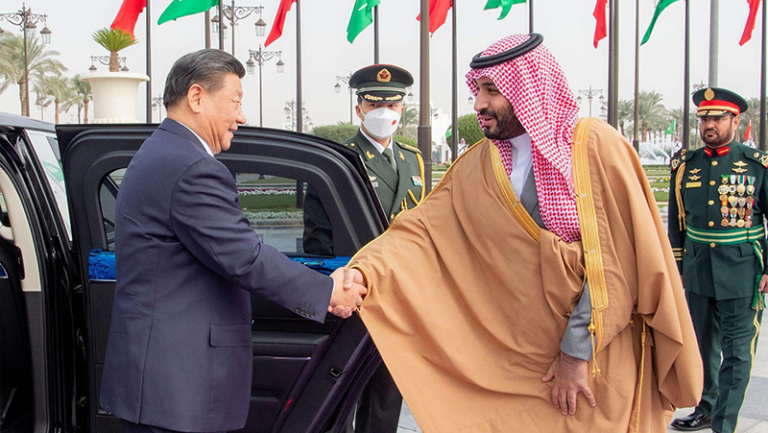
Saudi Arabia has just spent three days hosting Chinese President Xi Jinping in a summit that some believe could be fateful for the kingdom’s future strategic alignment and its move away from its close relationship with the United States, which has spanned eight decades. President Xi and Saudi King Salman bin Abdulaziz signed a “comprehensive strategic partnership agreement,” which evokes the positive relationship that used to tie together American and Saudi interests in years past. Xi also met with a number of other Arab leaders who appear just as eager as Saudi Crown Prince Mohammed bin Salman to look eastward in search of both long-term economic gains and a hedge against their countries’ perceived abandonment by the West. To be sure, developments at the summit in Riyadh nearly monopolized all informed commentary and news in the Arab world, the wider Middle East, the United States, and the world at large.
Xi’s visit was yet another step on the road to asserting the dominance and longevity of the authoritarian axis that stretches from East Asia to the Middle East, encompassing Russia and other former Soviet republics along the way. The fact that this nascent axis may come at the expense of America’s longstanding hegemonic geopolitical role, and may chip away at American economic supremacy, is an inevitable outcome of perceived weaknesses in US foreign policy. But danger lies ahead, specifically in the possible inability of authoritarian actors who are supposedly strong on strategy to provide the peace of mind that states like Saudi Arabia have been seeking for at least a decade now.
Indeed, the pomp and circumstance that accompanied Xi’s visit to Riyadh should not be misconstrued as heralding the end of the Gulf states’ exaggerated concerns about what they see as a fickle United States. China remains—and will remain for the foreseeable future—an economic actor looking for opportunities that it can exploit. And what better opportunity than signing deals with energy powerhouses like the Gulf states? It is true that Xi and Saudi leaders shepherded along some $30 billion in economic and other cooperation deals. But it is also true that Beijing has no interest in getting bogged down in the details of the Saudi-Iran dispute or in providing a security umbrella for Riyadh.
As things stand today, China wants to remain equidistant from Tehran and Riyadh, and in 2021, pledged $400 billion in investments in Iran over 25 years, a promise that it would not dream of rescinding in favor of more robust relations with Saudi Arabia. On the domestic front, China is still reeling from the impact of COVID-19, which has caused a serious decline in economic growth and an increase in unemployment, especially among the youth. In November, protests against COVID lockdowns broke out in many cities across China, in a clear challenge to state authorities and leaders that came just after Xi secured for himself an unprecedented third term in office. In other words, it is highly doubtful that cajoling President Xi will make China compensate Saudi Arabia, or others, for the supposed loss of US commitment to the kingdom’s security.
The United States surely is not thrilled that China has made consequential inroads in a geostrategic area as vital as the Middle East. In fact, National Security Council Spokesperson John Kirby minced no words in declaring that by increasing its influence in the Middle East, China is undermining the so-called “international rules-based order,” which is to say, the order managed by the United States. Nonetheless, it would be a stretch to conflate China’s economic relations with Saudi Arabia and other nations in the Gulf and the Arab world with the possibility that it might be in the process of replacing American political and geostrategic power in the region.
What should be of concern for the United States, however, is China’s potential success in buying oil and gas from Saudi Arabia and others with Chinese yuan instead of the US dollar, as Xi suggested during his visit. Not only would such a move be tantamount to a Saudi declaration of an economic breakup with the United States, but it would announce the beginning of a disengagement between Riyadh and Washington, one that the kingdom would be wise not to undertake, regardless of its desire to herald its independence and neutrality in global politics. Besides, conducting oil sales in Chinese yuan would expose Saudi finances—which are heavily reliant on oil revenues—to currency exchange fluctuations caused by China’s current and future economic uncertainties.
It is thus important to note that what transpired in Saudi Arabia last week should be understood as an ambitious step toward increasing economic cooperation between Saudi Arabia and China, predicated on a mutually beneficial exchange of goods and investment ventures. It can also be chalked up as a Mohammed bin Salman snub of President Joe Biden, who dared to criticize the Saudi leader early on in his administration; as a Saudi attempt to assert independence from its reliance on the United States; or as a Saudi assertion of the kingdom’s centrality to a region adrift in uncertainty and instability. Xi’s visit to Riyadh is not, however, a marker of Saudi Arabia finding the strategic and security peace of mind and the partner that it has sought for over a decade now, following the United States’ initial discussion of possibly devoting some of its resources to East Asia instead of concentrating them solely in the Middle East.
Featured image credit: Saudi Press Agency

